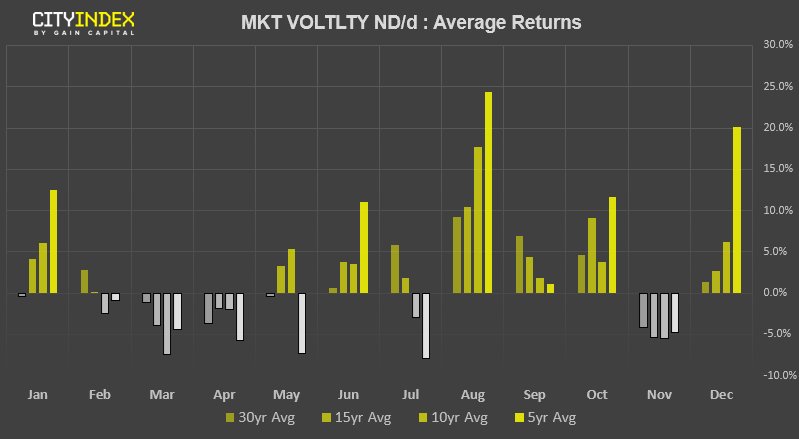Seasonality Suggests A Lower VIX For September
City Index | Aug 29, 2019 02:56AM ET
It's been a volatile month for markets, with the fallout from the ongoing trade war, attacks on the Fed, Brexit and Italian elections (to name a few rivers). This may feel counter to how markets ‘should be’ during the lazy summer periods yet, according to the seasonality for VIX, it appears to be on track for a typical summer month.

Taking the past 30 years of data, we can see that the VIX is typically higher during the month of August. Moreover, the average has increased if we measure over the past 5, 10 and 15 years. Whilst each August will have its own tale to tell, it can partly rationalised to a lower liquidity environment which can leave markets (such as the S&P500) more vulnerable to large moves from perhaps smaller headlines.
Looking forward, we can see that the level of VIX typically lowers during September as traders return to their desks. In turn, this could suggest we’re in for a period of dull, sideways trading or (hopefully) lower volatility at the beginning of new trends amid a more liquid market. Of course, time will tell, but it’ something to consider moving forward (and whilst the S&P500 remains rangebound).
It’s possible we may not see the S&P500 break out of range until traders (and therefore volumes) return, so traders could look to buy at the lows or short at the highs. However, we’ve noticed that the AAII Sentiment Survey (American Association of Individual Investors) has signalled a bearish extreme earlier this month. As with most sentiment indicators, timing can be off, but looking back through history shows that extremely low readings can occur some time around the actual price low, give or take a few weeks. The indicator is the spread between bullish and bearish investors, and the dotted lines represent +/1 1 standard deviation. And, given we’ve seen the yield curve invert which has historically been bullish for the S&P500, perhaps traders will want to enter long when they return from their break. As always, let price action be your guide.
Related analysis:
Forward Returns Following A US10-2 Year Inversion
Two Scenarios We're Watching On The Dax
Original Post

Trading in financial instruments and/or cryptocurrencies involves high risks including the risk of losing some, or all, of your investment amount, and may not be suitable for all investors. Prices of cryptocurrencies are extremely volatile and may be affected by external factors such as financial, regulatory or political events. Trading on margin increases the financial risks.
Before deciding to trade in financial instrument or cryptocurrencies you should be fully informed of the risks and costs associated with trading the financial markets, carefully consider your investment objectives, level of experience, and risk appetite, and seek professional advice where needed.
Fusion Media would like to remind you that the data contained in this website is not necessarily real-time nor accurate. The data and prices on the website are not necessarily provided by any market or exchange, but may be provided by market makers, and so prices may not be accurate and may differ from the actual price at any given market, meaning prices are indicative and not appropriate for trading purposes. Fusion Media and any provider of the data contained in this website will not accept liability for any loss or damage as a result of your trading, or your reliance on the information contained within this website.
It is prohibited to use, store, reproduce, display, modify, transmit or distribute the data contained in this website without the explicit prior written permission of Fusion Media and/or the data provider. All intellectual property rights are reserved by the providers and/or the exchange providing the data contained in this website.
Fusion Media may be compensated by the advertisers that appear on the website, based on your interaction with the advertisements or advertisers.